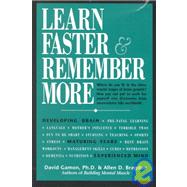| Introduction/Anatomy/Glossary | 9 | (8) | |||
|
|||||
| I The Developing Brain | |||||
|
|||||
|
17 | (5) | |||
|
|||||
|
22 | (6) | |||
|
|||||
|
28 | (6) | |||
|
|||||
|
34 | (6) | |||
|
|||||
|
40 | (8) | |||
|
|||||
|
48 | (7) | |||
|
|||||
|
55 | (6) | |||
|
|||||
|
61 | (5) | |||
|
|||||
|
66 | (6) | |||
|
|||||
|
72 | (5) | |||
|
|||||
|
77 | (8) | |||
|
|||||
|
85 | (7) | |||
|
|||||
|
92 | (8) | |||
|
|||||
|
100 | (6) | |||
|
|||||
| II The Maturing Years | |||||
|
|||||
|
106 | (7) | |||
|
|||||
|
113 | (5) | |||
|
|||||
|
118 | (8) | |||
|
|||||
|
126 | (6) | |||
|
|||||
|
132 | (9) | |||
|
|||||
|
141 | (6) | |||
|
|||||
|
147 | (8) | |||
|
|||||
|
155 | (6) | |||
|
|||||
|
161 | (10) | |||
|
|||||
|
171 | (7) | |||
|
|||||
|
178 | (8) | |||
|
|||||
|
186 | (9) | |||
|
|||||
|
195 | (8) | |||
|
|||||
|
203 | (6) | |||
|
|||||
|
209 | (3) | |||
|
|||||
|
212 | (8) | |||
|
|||||
| III The Experienced Mind | |||||
|
|||||
|
220 | (13) | |||
|
|||||
|
233 | (7) | |||
|
|||||
|
240 | (5) | |||
|
|||||
|
245 | (8) | |||
|
|||||
|
253 | (6) | |||
|
|||||
|
259 | (10) | |||
|
|||||
|
269 | (6) | |||
|
|||||
|
275 | (4) | |||
|
|||||
|
279 | (5) | |||
|
|||||
|
284 | (10) | |||
|
|||||
|
294 | (7) | |||
|
|||||
|
301 | (7) | |||
|
|||||
|
308 | (6) | |||
|
|||||
| Index | 314 |








